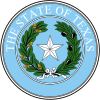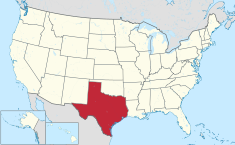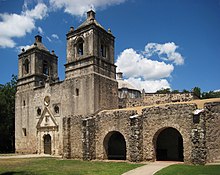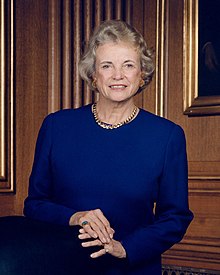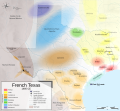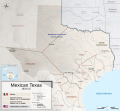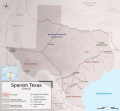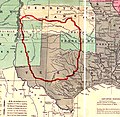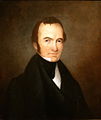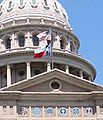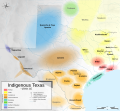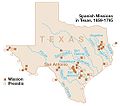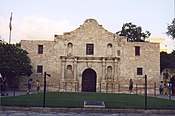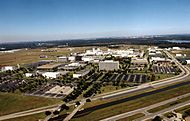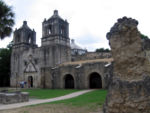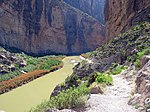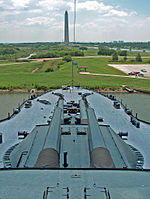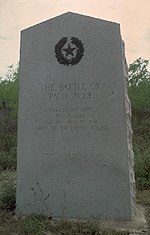Portal:Texas
The Texas Portal
Texas (/ˈtɛksəs/ ⓘ TEK-səss, locally also /ˈtɛksɪz/ TEK-siz; Spanish: Texas or Tejas, pronounced [ˈtexas]) is the most populous state in the South Central region of the United States. It borders Louisiana to the east, Arkansas to the northeast, Oklahoma to the north, New Mexico to the west, and an international border with the Mexican states of Chihuahua, Coahuila, Nuevo León, and Tamaulipas to the south and southwest. Texas has a coastline on the Gulf of Mexico to the southeast. Covering 268,596 square miles (695,660 km2), and with over 31 million residents as of 2024, it is the second-largest state by both area and population. Texas is nicknamed the Lone Star State for its former status as an independent republic. Spain was the first European country to claim and control Texas. Following a short-lived colony controlled by France, Mexico controlled the land until 1836 when Texas won its independence, becoming the Republic of Texas. In 1845, Texas joined the United States of America as the 28th state. The state's annexation set off a chain of events that led to the Mexican–American War in 1846. Following victory by the United States, Texas remained a slave state until the American Civil War, when it declared its secession from the Union in early 1861 before officially joining the Confederate States of America on March 2. After the Civil War and the restoration of its representation in the federal government, Texas entered a long period of economic stagnation. Historically, five major industries shaped the Texas economy prior to World War II: cattle, bison, cotton, timber, and oil. Before and after the Civil War, the cattle industry—which Texas came to dominate—was a major economic driver and created the traditional image of the Texas cowboy. In the later 19th century, cotton and lumber grew to be major industries as the cattle industry became less lucrative. Ultimately, the discovery of major petroleum deposits (Spindletop in particular) initiated an economic boom that became the driving force behind the economy for much of the 20th century. Texas developed a diversified economy and high tech industry during the mid-20th century. As of 2022[update], it has the most Fortune 500 company headquarters (53) in the United States. With a growing base of industry, the state leads in many industries, including tourism, agriculture, petrochemicals, energy, computers and electronics, aerospace, and biomedical sciences. Texas has led the U.S. in state export revenue since 2002 and has the second-highest gross state product. (Full article...) Selected article -The battle of Concepción was fought on October 28, 1835, between Mexican troops under Colonel Domingo Ugartechea and Texian insurgents led by James Bowie and James Fannin. The 30-minute engagement, which historian J. R. Edmondson describes as "the first major engagement of the Texas Revolution", occurred on the grounds of Mission Concepción, 2 miles (3.2 km) south of what is now Downtown San Antonio in the U.S. state of Texas. On October 13, the newly created Texian Army under Stephen F. Austin had marched towards Bexar, where General Martín Perfecto de Cos commanded the remaining Mexican soldiers in Texas. On October 27, Austin sent Bowie and Fannin, with 90 soldiers, to find a defensible spot near Bexar for the Texian Army to rest. After choosing a site near Mission Concepción, the scouting party camped for the night and sent a courier to notify Austin. After learning that the Texian Army was divided, Cos sent Ugartechea with 275 soldiers to attack the Texians camped at Concepción. The Texians took cover in a horseshoe-shaped gully; their good defensive position helped them to repel several Mexican attacks, and the Mexican soldiers retreated just 30 minutes before the remainder of the Texian Army arrived. Historians estimate that between 14 and 76 Mexican soldiers were killed, while only one Texian soldier died. (Full article...) Selected biography -Sandra Day O'Connor (March 26, 1930 – December 1, 2023) was an American attorney, politician, and jurist who served as an associate justice of the Supreme Court of the United States from 1981 to 2006. Nominated by President Ronald Reagan, O'Connor was the first woman to serve as a U.S. Supreme Court justice. A moderate conservative, she was considered a swing vote. Before O'Connor's tenure on the Court, she was an Arizona state judge and earlier an elected legislator in Arizona, serving as the first female majority leader of a state senate as the Republican leader in the Arizona Senate. Upon her nomination to the Court, O'Connor was confirmed unanimously by the United States Senate. O'Connor usually sided with the Court's conservative bloc but on occasion sided with the Court's liberal members. She often wrote concurring opinions that sought to limit the reach of the majority holding. Her majority opinions in landmark cases include Grutter v. Bollinger and Hamdi v. Rumsfeld. In 2000, she wrote in part the per curiam majority opinion in Bush v. Gore and in 1992 was one of three co-authors of the lead opinion in Planned Parenthood v. Casey that preserved legal access to abortion in the United States. On July 1, 2005, O'Connor announced her retirement, effective upon the confirmation of a successor. At the time of her death, O'Connor was the last living member of the Burger Court. Samuel Alito was nominated to take her seat in October 2005, and joined the Supreme Court on January 31, 2006. (Full article...) Texas news
Wikinews Texas portal
ListsState symbols
Texas topicsSelected imageCities -Lubbock (/ˈlʌbək/ LUB-ək) is a city in the U.S. state of Texas and the county seat of Lubbock County. With a population of 266,878 in 2023, Lubbock is the 10th-most populous city in Texas and the 84th-most populous in the United States. The city is in the northwestern part of the state, in the Great Plains region, an area known historically and geographically as the Llano Estacado, and ecologically is part of the southern end of the High Plains, lying at the economic center of the Lubbock metropolitan area, which had an estimated population of 360,104 in 2023. Lubbock's nickname, "Hub City", derives from it being the economic, educational, and health-care hub of the multicounty region, north of the Permian Basin and south of the Texas Panhandle, commonly called the South Plains. The area is the largest contiguous cotton-growing region in the world and is heavily dependent on water from the Ogallala Aquifer for irrigation. (Full article...) General imagesThe following are images from various Texas-related articles on Wikipedia.
CategoriesSelect [►] to view subcategories
Related pages
Attractions
 Things you can doAssociated WikimediaThe following Wikimedia Foundation sister projects provide more on this subject:
SourcesMore portals | ||||||||||||||||||||||||||||||||||||||||


